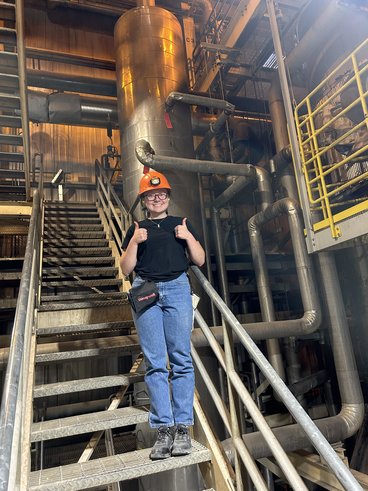
Written by Rachel Kraft Mattson
Taking a full year off from college can seem daunting to a lot of students, but BBE junior Eilee Keske thinks students should consider it. Especially if it is to pursue cooperative education, also known as a co-op.
This is exactly what she, and many fellow BBE students do during their sophomore or junior years. Keske started work at Sappi paper mill in Cloquet, Minnesota in June. The co-op is a 15-month appointment, where she works full time in the environmental department as a chemical engineer.
Keske has followed in the footsteps of many BBE students and is currently being trained by a classmate who is at the tail end of their co-op. Paper Science and Engineering (now known as Bioproducts Engineering) alumni Tom Radovich is currently the managing director of the mill in Cloquet, and has been a BBE advisory board member since 2021, further solidifying the Sappi and BBE connection.
Professor Ulrike Tschirner said the partnership was strengthened after the department worked on a mutual project with Sappi. “They started hiring one of our students a year, but liked them so much they expanded to two.”
Within the environmental co-op, students learn the recurring tasks and inspections required to keep the mill in compliance. Some of these tasks take place daily, weekly, monthly or quarterly, so having the extended 15-month program allows students to learn a substantial amount on the job.
Keske says the more involved co-op allows you to see projects from start to finish. Students in the co-op also get opportunities to lead projects, something that is not as common in a three-month internship setting.
“People think a 15-month program is too long, but it takes a year or more to get comfortable in a position and fully carry-out a project,” said Keske. “I just started leading a Lean Sigma Six project, and will be working towards getting a Green Belt Certification in Lean Six Sigma, which the mill just started to offer to co-op employees.” This experience is valuable to an undergraduate student, as the certification indicates students can use data to problem solve, reduce or eliminate waste resources, and decrease defects to improve efficiency.

With 15 months of full-time work as an engineer under her belt at the end of her co-op, Keske hopes the experience will provide new understanding to the classes she will take her senior year. “Having a little bit of industry experience before you take some of the classes can help you apply the concepts right away.”
In addition to better understanding in the classroom, she hopes the 15 months of working full time as an engineer will make her stand out more as a candidate during her post-grad job searches.
“During a co-op they work as "real" process engineers, much more real life,” said Professor Tschirner. “They are the first group [of graduates] walking out the door with great job offers, often from the company they did the co-op with, but other companies love the experience on the resume too.”
Keske also emphasized the mental change that can happen when switching from going to school full time versus working full time. “During school I always felt like there was something that I should be doing, which weighs on you,” she said. “When it comes to the co-op, even if I have to work a long day, I am not doing any other work outside of my co-op hours. The clearer boundaries have been a welcome shift, alleviating the potential for burnout. The free time during evenings and weekends has been great too.”
If a student wants to pursue a co-op like the one at Sappi, Keske recommends they talk with an advisor on how to logistically take a year off from school. She was able to defer her scholarships and financial aid, and will take all the same classes she initially planned for her senior year. It is more straightforward than she initially thought.
“Even if you think you’re against a co-op, still take the time to consider it, for your future and for your career,” said Keske. “Don’t think that you don’t have enough experience to get a co-op.”